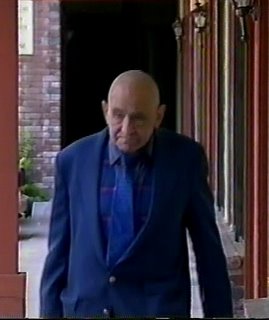
by Martin Paskind (all the red)
A lawyer who represents himself, an old saw says, "has a fool for a client." Let's check this out. Irving Kanarek is a longtime lawyer. He represented himself. And just as the old saw predicts, he hasn't done really well so far. There's another old belief, perhaps supported by too little evidence, that we in the legal profession are ethical, honest, and honorable people. Well, maybe. Kanarek may not think so.
Kanarek was a California lawyer who became famous years ago as Charles Manson's defense attorney. Manson was a cult figure whose followers killed an actress named Sharon Tate and several other people. One of his followers took a shot at Gerald Ford, when he was president. Until O.J. Simpson turned up, Manson probably was Los Angeles' biggest homicidal celebrity.
Fame doesn't last. Few people remember Kanarek, although he was well known for his wardrobe and habits during the decade or so following the Manson case. During that time, Kanarek prospered reasonably well. In fact, he had a household staff of two, Jose and Hermalinda Rangel. In January 1989, more than eight years ago, the Rangels sued Kanarek for breach of contract, fraud, and malpractice.
Kanarek represented himself. Then, in November 1989, he wound up in a locked psychiatric ward at Harbor-UCLA Medical Center. There Kanarek remained for a very long time.
Kanarek's hospitalization got lots of press in Los Angeles. Kanarek was the kind of guy that the papers love to write about, and that lawyers love to gossip about. The Rangels and their lawyers, Nancy Kaufman and Edwin Printemps, knew about it, along with the rest of L.A. Kanarek's mental condition didn't slow Kaufman and Printemps down. They went right ahead with the Rangels' case.
Kaufman and Printemps took part in two in-court settlement conferences. They then set an uncontested hearing in August 1990. They didn't say a word to the judge about Kanarek's whereabouts and said nothing about the defendant's state of mind. They didn't ask for a guardian ad litem to look out for Kanarek. Kaufman and Printemps wanted a default judgment that they could present for payment to the Client Security Fund of the California State Bar. Very few readers of L.A. newspapers back in 1990 were unaware of Kanarek's circumstances, but one of the unaware, apparently, was the judge. This supports a theory of mine that judges need not read newspapers because they know everything already. However that may be, the judge ruled in favor of Mr. and Mrs. Rangel and against Kanarek. This fate frequently befalls litigants who don't show up in court.
The Rangels took their judgment to the security fund, which, in turn, sued Kanarek to get its money back. At about this point, Kanarek got out of Harbor-UCLA Medical Center. He was not a happy man. Naturally, he sued everybody in sight. Kanarek went after Kaufman and Printemps for abuse of process, fraud, and intentional infliction of emotional distress.
Kanarek made things as hard as he could for the trial and appellate judges. They said, "The first cause of action alone runs 39 pages, much of it filled with material concerning alleged statements by defendants which the trial court found to be clearly privileged...as statements uttered in a judicial proceeding." Nevertheless, the judges found, buried amid the discarded matter, allegations that the litigation privilege did not protect Kaufman's and Printemps's silence.
The two lawyers did not like that outcome, so they took the case up on petition for writ of mandate. The two defended themselves energetically. They claimed a perfect right to keep their mouths shut about Kanarek's whereabouts.
Appellate judges faced the issue of whether concealment by silence, without accompanying statements, qualifies for immunity under the litigation privilege. "The answer," they said, "lies in the complex nature of silence itself. Silence can signify nothing, or it can communicate a good deal, all depending on context."
Kaufman and Printemps, said the appellate court, given their knowledge, "had a duty to advise the court of [Kanarek's] condition and of the need to appoint a guardian ad litem for him. But the defendants kept the information to themselves, breaching this duty."
"There is," the court continued, "a truth at the core of Kanarek's claims. This is the principle that a plaintiff may not take advantage of a defendant's legal disability to obtain a judgment without a fair adversary hearing. A plaintiff who is aware of a defendant's mental incapacity or some other factor preventing the defendant from participating in a legal proceeding is duty-bound to inform the court of this fact."
This sort of conduct, said the judges, is fraud extrinsic to, or outside, the judgment. Such fraud allows the court to set aside the judgment. "Kanarek, however, seeks something else in this action," said the court. "He seeks to establish defendants' liability in tort for their breach of this duty of disclosure. It is this claim for monetary damages that runs headlong into the litigation privilege."
Just askin'!
3 comments:
transvestitism is neither illegal no grounds for a murder
Good points, everybody. The defense did suck, I suppose, but as I've said before, Bugliosi freely admits to not wanting to confuse the jury with things you can't prove. If he could have proven the drug angle as motive, I'm sure he would have. Since he couldn't he hung it all on the Helter Skelter angle.
Very interesting read of your views. I dated Irv in the 60s
I found him very considerate but different. The backseat of his small car was filled with his files. I am glad I met him. He taught me to try to understand the obvious.
Post a Comment